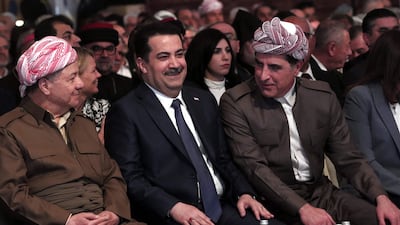Last year’s decision by the Kurdistan region’s parliament to extend its term by a year was unconstitutional, the Iraq Federal Supreme Court ruled on Tuesday.
The current parliament was inaugurated after the 2018 elections.
A vote was supposed to be held last year but was postponed over differences between the major ruling parties, the Kurdistan Democratic Party and the Patriotic Union of Kurdistan.
Due to disputes at the time, the two parties who share power in the semi-autonomous region agreed to extend parliament so they could continue negotiations over issues such as amending the elections law and sharing revenue from taxation and oil.
“The constitution stipulates that the parliament term is four years and anything against that is considered null,” said Judge Jassim Mohammed Aboud, head of Iraq's top court.
The move to extend the term by one year undermined democracy in the country, Mr Aboud said.
All decisions made by the regional parliament from the date of its term extension in October 2022 are therefore considered null and void, he added.
The ruling throws the region’s parliamentary elections scheduled for November into doubt.
It also further complicates the political scene in the Kurdish region, where the rival parties are part of a super bloc in Baghdad, the State Administration Coalition, an uneasy alliance of some of the country's largest parties.
Historically, the PUK has had close ties to Iran and Tehran-linked parties in Baghdad, while the KDP has had mixed relations with political parties in Baghdad and has built strong ties with Turkey.
Sarwa Abdul Wahid, a Kurdish member of the federal parliament in Baghdad and senior member of the major opposition party in the Kurdish region which filed the case, hailed the ruling.
“It is an important and historic ruling,” Ms Abdul Wahid said at the court. “This is first time in Kurdistan region when there is a party telling them [KDP and PUK]: you can't extend your term.”

She demanded that the federal independent electoral commission oversee the coming elections.
Since last year, the PUK and KDP have been at loggerheads over many issues, including elections, power-sharing, assassinations of PUK-linked officials and sharing oil and gas revenue. Some analysts say the current dispute between the two groups, sometimes referred to as a duopoly, is one of the most bitter since the two parties fought a civil war in the mid-1990s.
On elections, the PUK wants to amend the current parliamentary elections law to divide the region into four constituencies and to review the voters’ roll, alleging it contains false names.
In recent weeks, both parties reached a comprise that allowed PUK to end its boycott and return to cabinet meetings. They also tentatively agreed on amending the election law and reactivating the region's independent electoral commission.
Fighting in parliament
But the positive atmosphere was spoiled last week when KDP forced a vote only on reactivating the electoral commission – in theory meaning elections could go-ahead, provided the electoral commission had enough time to prepare for them in November.
The vote sparked a fist-fight in parliament between representatives of the two parties.
Alarmed by the latest development, the UN mission on Wednesday expressed concern over political infighting between KDP and PUK.
Jeanine Hennis-Plasschaert, the UN Secretary General's special representative for Iraq, voiced concern over the situation late on Wednesday.
“Ongoing political infighting in KRI [the Kurdistan Region of Iraq] is very disturbing,” Ms Hennis-Plasschaert said.
“Once again, we call on all parties to work in the interest of all peoples and find common ground on outstanding electoral issues soonest,” she added.


